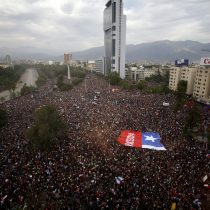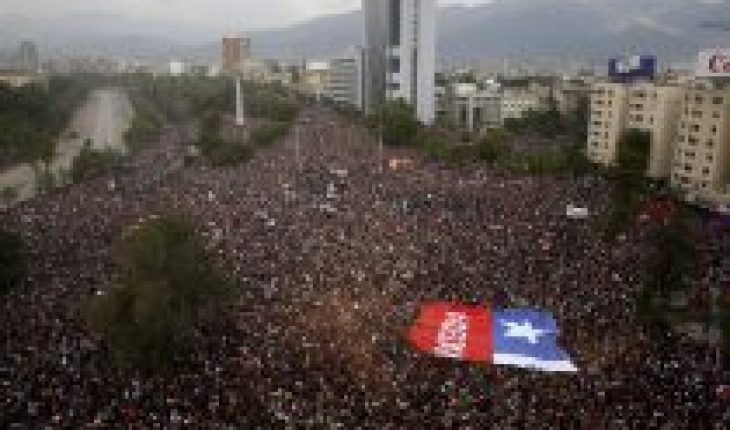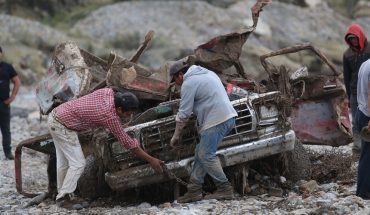
I entered this debate because I learned that someone was quoting my book, Development and Inequality in Chile (1850-2009). History of its political economy (Centro Barros Arana, 2017; LOM, 2018), in support of a thesis that I consider wrong. I did not resist the desire to express an opinion. Maybe it was vanity. Or, in a kinder read, teaching commitment. I spent ten years doing that work and in identifying a mistake I couldn’t help but point it out. On reflection, perhaps it was superb (which, like vanity, abounds in the academic environment). Later Paniagua wrote a response to my column, which motivates this, my second and last speech.
Paniagua insists that, as inequality has its roots in the distant past, subsequent history and in particular the social, economic and political model imposed in dictatorship is not relevant to explain the current situation. I consider that a mistake, and in any case my book does not support that thesis. It can be said, as I do there, that distant history matters and so does close history. Because if inequality is anchored in a long-standing phenomenon such as the excessive power of the elites, it is because from then until today, as a former Argentine president would say, “things happened.”
Some maintained and reinforced this power, such as the expropriation suffered by the native peoples and the subsequent distribution of large tracts of land in La Araucanía; or privatizations, which facilitated the looting of the Chilean state by economic groups during the dictatorship, as documented by María Olivia Mönckeberg. But, also, processes of change that were truncated, such as the agrarian reform of the sixties and seventies, violently aborted and reversed by the dictatorship.
It so happens that, beyond its virtues, acemoglu and robinson’s approach, on which Paniagua bases his point of view, has serious problems. In particular, the way he treats the relationship between the long term and the subsequent development, what Gareth Austin has called the “understanding of history,” a mistake that Paniagua repeats. Also the simplistic treatment of historical processes, a tendency that Branko Milanovic (perhaps the leading specialist on inequality) has characterized as a combination of Wikipedia with regressions.
Emphasizing the role of long-term does not imply ignoring medium-term or conjunctural factors. What it is about is seeing how they are articulated. And for now, we have no reason to change the consensus diagnosis by the literature that has studied the problem. That the current situation is a direct consequence of the economic-institutional model implemented in dictatorship (not in 1990), which has commodified in an extreme way the different dimensions of the life of Chileans, from the cradle to the grave.
Then there is the question of the relationship between this inequality and the malaise that led to the outbreak, first, and then the constituent process. On this, Paniagua maintains that my analysis “lacks argumentative depth.” He’s right. Moreover, it falls short. In my column there is not even analysis. As I explained, since that topic had been the subject of previous publications, I did not address it. I merely expressed my conclusion by means of an analogy that I consider to be in line with the problem. Perhaps I should formulate and develop my argument. I do so now, but also briefly for reasons of space. I invite anyone who is interested in it to read the notes to which I referred then and which can be easily found on the web.
From reading his columns, I sometimes get the impression that Paniagua believes that others are blinded by ideology, unlike him, which only appeals to evidence. But if most of the analyses of the outbreak, prepared by specialists from different disciplines, both in Chile and in the rest of the world, pointed to inequality as one of its causes, it was because there are good reasons and abundant empirical evidence to do so. Those who think this are not – or are – more influenced by our ideological perspectives than those who, like Paniagua – or Carlos Peña, whom he quotes with approval – argue the opposite.
It is true that there is no study to show that the malaise and outburst were caused by inequality. Nor should there be those who prove otherwise, that they would be the relevant ones, as science advances through falseness. In fact, there may never be, because establishing causal links in complex and unrepeatable social processes is extremely difficult.
The problem is that inequality is not a necessary conditionria not enough for an outburst to occur. That is why Paniagua is wrong when he argues that, if she were the cause, we should see explosions in those countries that have a distribution as bad as Chile. Their mistake lies, it seems to me, in a misconception of causation. The fact that one phenomenon is not a necessary or sufficient condition of another does not mean that it does not cause it. There are drunk people who drive their car and arrive at their destination safe and sound, and others who have not taken alcohol and have accidents; but if a drunk driver runs over a passerby, both we and the judge dealing with the case will consider that his drunkenness had something to do with the matter. That is also the case with the relationship between obesity and a heart attack. There are obese people who enjoy excellent heart health, and there are those who suffer from cardiac arrest without being overweight. But if a doctor learns that his patient, who weighs 140 kilos, has had a heart attack, he will surely think that obesity had something to do with it. And he would do well to do so, even if he had previously weighed 170 kilos and was losing weight. Because it has been the maintenance of high inequality for a long time that caused – along with other factors – that Chilean society accumulated unrest until it exploded. As with blood pressure; they are phenomena that corrode slowly, until, sometimes, the day comes when they explode.
The consequences of high inequality for social cohesion, political stability and economic growth are classic problems of the social sciences. Literature on them abounds and has multiplied in the last two decades, especially after 2008. As far as we know, societies with high inequality function poorly in a number of areas. A poor distribution of income is often – though not necessarily – an obstacle to economic growth and a corrosive of institutional quality, a factor that worries both Paniagua and me. For all these reasons, it usually feeds a social unrest that can lead to an outbreak. Whether or not that will happen, or when, we cannot foresee it. But it’s hard to deny it when it’s happened.
Inequality alienates the ruling elites and often blinds them to the fundamental dynamics of the society in which they live. Such blindness can cause a minister, who has known only privileges, to add fuel to the fire by telling his compatriots that they must get up earlier to take the Metro and go to work. Or another, to acknowledge that his plans to combat the pandemic failed because he was unaware of the conditions in which people live outside the eastern sector of Santiago.
Paniagua insists that he cannot be behind the explosion because it has been shrinking. As I mentioned, the problem is in the level, not the trend of slight and slow improvement. As UNDP has shown, in Table 3 of its report “Human development indices and indicators. 2018 Statistical Update”, in the year before the outbreak, Chile was among the twenty most unequal countries out of a sample of 150. That in that group he was accompanied by other Latin Americans, such as Brazil or Colombia, I do not think is any consolation.
One thing that Paniagua and I agree on is the precariousness of the Chilean middle class. The point is that this is the result, among other factors, of a distribution that particularly punishes it, impoverishing it. This is for a very simple reason: given any level of income, a higher concentration at the top means less for the rest.
This phenomenon is documented in Table 1, where I show the results of an exercise presented in Figure 37 of my book. Although it is already a few years old, the general image it provides remains valid. It shows that, although in 2011 the average income in Chile was 12% higher than in Uruguay, as it is a more unequal country, 60% of Chileans in the middle sectors (deciles 3 to 8) lived on lower incomes than their Uruguayan counterparts. Because the country’s greatest wealth is concentrated entirely at the top. Worse still, with lower incomes, they had to – and still should – borrow to pay for services that, like college education, in Uruguay and other parts are paid for through taxes. And let us make one thing clear: my country is far from being an egalitarian utopia. In fact, like the rest of the continent, it has a high inequality in international terms, only not as extreme as Chile.
According to his columns, Paniagua is worried about his country and fears that the constitutional process will change things that he believes work well, leaving intact those that he thinks should be changed, thereby affecting long-term economic growth. He also believes that expert knowledge has things to contribute to this process. Le preothere is ignorance. I share all these concerns (including that of growth without which, incidentally, reducing inequality becomes much more difficult). But I also have another one, which I don’t know if he shares: I’m worried about the ignorance of the elites.
The truth is that the ignorance and blindness of businessmen, politicians and technocrats is much more dangerous than that of the rest of the population. More than half a century ago, Aníbal Pinto pointed out that Chilean elites distinguished themselves from Latin American elites by their ability to perceive the need to adapt and to do so when change was needed. But, if they ever had that lucidity, the process of the last few decades shows that they have lost it.
For years, academia, international organizations and journalistic media – such as this and others – have been insisting that inequality was a problem. That abuse was a problem. That abuse was a problem. That lean pensions were a problem. That inequality in access to health care was a problem. That the depletion of natural resources and the destruction of the environment were a problem. That the current Constitution, illegitimate in its origin, was a problem. That the corrupt mechanisms that have allowed economic elites to influence policymaking – and even legislation – were a problem. That continuing with a style of economic growth that is underpinned by all of that was a problem. That, in the long run, the sinking of the ship would also affect those traveling in first class.
It was a diagnosis that didn’t match them and they refused to listen to it. They thought Chile was doing well, because they were doing well. In the meantime, they were enriched by the mechanisms that overwhelm most of their compatriots. But you cannot cover the sun with your hand, even if it is full of bills.
This is a classic historical problem: revolutions occur, not least because those in the ruling class resist changes when they believe – often rightly – that they will reduce their privileges. And to convince themselves that they are right, they only hear from those who say what they want to hear. The extraordinary thing is that, with all that has happened, many maintain that attitude.
There is no guarantee that the constituent process will lead to a better country than the current one. Critical junctures have that: their results are unpredictable. The blindness and ignorance of the elites, their inability to understand some of the fundamental problems of the country in which they live – such as the effects of inequality – feeds this uncertainty. The fact that Cecilia Morel, who was able to recognize that they should “diminish their privileges and share with others,” is more insightful than Carlos Peña, is not very encouraging.
The content of this opinion column is the sole responsibility of its author, and does not necessarily reflect the editorial line or position of El Mostrador.





